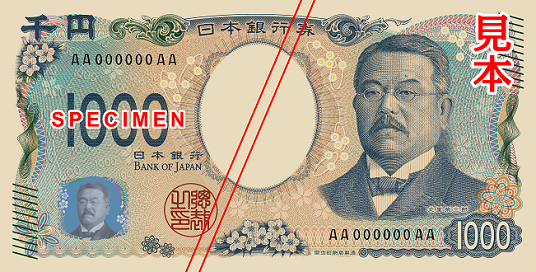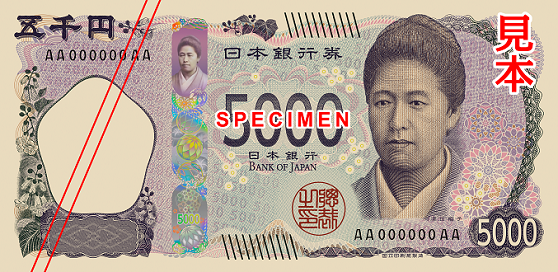Already back in the beginning of July, the Japanese government has begun to issue new banknotes, the first one to feature English in their design (Bank of Japan). They took a while to trickle down to Kyoto, and even longer to make it into my own wallet, but here they are, courtesy of National Printing Bureau, Independent Administrative Institution (独立行政法人 国立印刷局):

The new 1000 yen bill features Kitasato Shibasaburo (1853 – 1931), a Japanese bacteriologist. While he was sent to Hong Kong during an outbreak of the bubonic plague in 1894, he isolated the bacterium that caused the plague, just days ahead of Alexandre Yersin who is generally (the only one) credited with the discovery.
He was also nominated for the very first Nobel Prize in Medicine, for the work he and Emil von Behring did on the diphtheria antitoxin serum. However, only von Behring received the Nobel Prize for this discovery, probably because Kitasato was only a student at the time.
He kept working on infectious diseases for his entire life, and founded the Kitasato Institute, now a private university for medicine, in Tokyo.

Like the last 5000 yen bill, this one also features a woman: Tsuda Umeko (1864 – 1929), who was educated in the US as a child and later even went to college there. Upon her return to Japan, she became an educator and founded Tsuda Women’s University in Tokyo.
Throughout her life, she was a strong advocator for women’s education and social reform. Interestingly, she was not an advocate of women’s suffrage or even a feminist movement.

Finally, the 10000 yen note shows, quite fittingly, Eiji Shibusawa (1840 – 1931), an industrialist of the Meiji period who introduced capitalism to the country and founded the first modern bank of Japan, which was even allowed to print its own banknotes.
Born into a farmer’s family, his aptitude for finances landed him in the household of the (future) shogun and, after the Meiji Restoration, in the new Ministry of Finance. He resigned in 1873 and, besides the First National Bank, founded more than 500 other corporations, among them the Tokyo Stock Exchange, the Japanese Chamber of Commerce and Industry, Tokyo Gas, and the Imperial Hotel Tokyo, all without holding a controlling stake in them.
Furthermore, he was also involved in projects related to social welfare and education, like the Japan Red Cross, which he founded as well. He was granted the title of viscount and in 1929 was nominated for the Nobel Peace Prize. Today, he often features in Japanese manga and fiction.
Interesting people! Let’s hope many of them make it into my wallet in the future!
